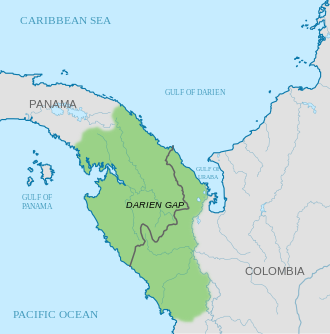Migration through the Darian Gap is cut off following the capture of the boat captains in Colombia.
Friday, March 1, 2024
Source: Story by MEGAN JANETSKY, Associated Press

MEXICO CITY (AP) — The flow of thousands of migrants daily through the treacherous migratory highway, the Darien Gap, has been cut off following the capture of a number of boat captains who had been ferrying the migrants to the starting point of their jungle trek.
The stoppage began when Colombian law enforcement captured two boat captains in the northern city of Necoclí on Monday. The companies that employed them halted all transport services in protest, effectively cutting off the officially estimated 2,000 people a day that enter the jungled passage hoping to reach the United States.
It has led to a build up of as many as 8,000 people waiting to cross between Colombia and Panama, the Colombia’s Ombudsman’s Office confirmed Thursday. The office, a governmental human rights watchdog, has warned that the buildup could “overwhelm the health system, food supply, among other things."
“We can't wait until things collapse and it ends in a violation of human rights” of already vulnerable migrant populations, said Carlos Camargo Assis, the head of the office.
The chaos has once again underscored the long road ahead for officials in Latin America and the United States as they struggle to take on record levels of migration, and unravel the increasingly lucrative migrant trafficking industry.
President Joe Biden has pressured Colombia and other Latin American nations to crack down on regional migration headed to the U.S. southern border. While many Latin American countries have boosted enforcement, the jungles of the Darien Gap have remained a lawless swath of the migratory route north, largely controlled by Colombia’s most powerful drug gang, the Gulf Clan.
Last year, more than 500,000 people crossed the Darien Gap, many traveling from Venezuela, and other Latin American, African and Asian countries. From there, migrants wind up through Central America and Mexico and land on the U.S. Mexico border, where authorities came across migrants 2.5 million times in 2023.
The unprecedented influx of people has returned to the spotlight in the lead-up to the November 2024, and both Biden and former president Donald Trump planned to pay visits to the border on Friday.
The captured boat captains had been transporting more than 150 migrants from Necoclí across a stretch of the Caribbean to another Colombian city from which they began their trek north, Colombia's Prosecutor's Office said Wednesday.
The captains worked for two tourist transport companies, which prosecutors said were a front for transporting migrants, charging between $140 to $300 a head for traveling just a handful of miles by sea.
Such companies take advantage of migrants' vulnerability to line their own pockets, said one official with the Prosecutor's Office, who asked not to be named because he wasn't authorized to speak on the matter.
"They charge them absurd amounts of money (to travel) without even the basic security conditions. They pack them in like canned sardines," the official said in an interview with The Associated Press. “They trick them, they lie to them.”
He said the captures were meant to send a warning to those involved in trafficking, and to “break the chain” of the illegal industry of transporting migrants, which has grown more lucrative as migration has surged in the Americas. But he said the system in the Darien Gap is now so entrenched that he worries that when they capture one trafficker, “two more pop up."
With no clear end to the stoppage in site, the Ombudsman’s Office expressed concern that things could only get worse. The small population 20,000 town of Necoclí faced a similar build up of more than 10,000 migrants three years before, effectively collapsing the city.











